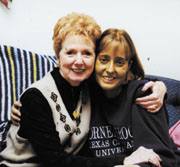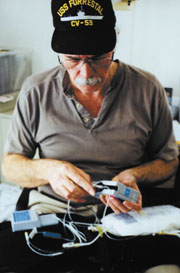Roses are being ordered, dinner reservations are being made and cards with red envelopes are being sent. Valentine's Day, the holiday devoted to lovers, is just around the corner.
The Legend The History Channel offers insight into the legend and history of Valentine's Day. St. Valentine's compassion and appreciation for love are the founding principles of Valentine's Day. The legend tells of a decree by Roman Emperor Claudius II that young, single men with potential to be soldiers could not be married. Claudius felt men without wives or children were more able to fight without thoughts of home. Valentine found the law to be unfair and arranged secret matrimonial ceremonies for young lovers. When discovered, Valentine was ordered to death.
Symbols According to mydearvalentine.com (http://www.mydearvalentine.com), there are many symbols that are associated with the Valentine's season. Cupid, one of the most common symbols, is a mischievous, winged child who pierces the hearts of young men and women with arrows to make them fall madly in love. Roses, as the queen of flowers, symbolizes peace, love and forgiveness. The color of the rose carries significance. White roses are for true love and purity of the mind, red roses are for love and passion, yellow roses are for friendship and pink roses mean friendship or sweetheart. The heart stands for love and of giving one's soul to another. A heart, pierced by Cupid's arrow, has become one of the most famous Valentine's symbols. Lovebirds were believed to find mates on Valentine's Day. It is said that the lovebirds can't live without their mates.
Sappy Romance or Just Another Day? Valentine's Day is filled with traditions and symbols prevalent in TCU students' celebrations. Depending on their relationship status, students said they either dread or anticipate the arrival of Valentine's Day. Russell Matthews, a sophomore psychology major, has spent this week planning a gift and a date for his girlfriend. "This is my first Valentine's Day (with my girlfriend), and I am quite excited," he said. "I've spent a lot of time thinking about what to give her and what we're going to do." Excitement isn't the only emotion couples meet the day with. "Last year I had a boyfriend, and the day was really nerve-wracking," Sarah Brand, a junior English and French major said. "I had my friends remind him it was Valentine's Day and make sure he had some sort of plans." Students without someone to share the day with often look at the holiday differently. "Valentine's Day is great if you have someone special to celebrate it with," Jason Horne, a junior criminal justice major, said. For some students, seeing couples enjoy the day may bring bad feelings toward Valentine's Day. "I've never had a Valentine," Brad Biggs, a sophomore biology major said. "I hate watching those lovey-dovey couples walk around. I think Cupid should start using a 9 mm because he shoots me in the heart every Valentine's Day." Lauren Barresi, a freshman pre-major, is not looking forward to Monday either. "I'm not a big Valentine's Day fan at the moment," she said. "It's depressing if you don't have a significant other to spend it with, especially if all your friends do." Brand, who is currently single, is choosing not to celebrate Monday as Valentine's Day. "It's one of my roommate's birthdays, so we're all looking at it as that," she said. Biggs is simply looking at it as "just another day." Valentine's Day doesn't have to be just about romantic love, however. "If you don't have girlfriend, there's at least always a friend that's a girl," Johnny Ferraro, a sophomore psychology major, said. "People see it as a sappy romantic day, but it's more of an appreciation day."
"It's a day simply about love," she said. "I'm going to bake cookies and send candy and notes to my friends just to show them I care."
Getting the Better Deal Among the sexes, many students said Valentine's Day has different implications. "It's a great holiday unless you're broke," Horne said. "Why can't the girls pamper us?" "It's definitely dedicated to the females," Ferraro said. Though their wallets may suffer, many male students said they agree that their girlfriends are worth the time and money put into the day. "I usually give roses and do something special for the person I'm dating," Todd Thompson, freshman finance major, said. "I think the girls get special treatment they deserve, but sometimes the guys get shafted." "I've spent a lot of money, but she's worth every penny," Matthews said. The amount of money males spend on females doesn't go unnoticed or unappreciated. "Girls traditionally get better gifts," Brand said. "Although, I do think some girls try to make it even because they realize it's a special day." Brand feels a large amount of money isn't necessary for a good Valentine's date. "I don't want the expensive dinner," she said. "I'd just like to have a meal."
Still Hope Whether students choose to celebrate with their significant others or spend the day cursing Cupid, the overall outlook for Valentine's Day is optimistic. "I still have hope for Valentine's Day," Thompson said. "It's a great way to spend romantic time with the opposite sex." Other students believe love can be celebrated any day of the year, not just February 14. "Valentine's Day doesn't bother me," said Erin Anderson, a sophomore psychology major. "I don't get upset if I'm not with somebody. I can go out to dinner anytime." Stence will continue to celebrate Valentine's Day whether she has a boyfriend or not. "It's a day all about showing the people who you love how much you care."
By Danielle Daniel siff staff TCU life finally hits the big screen. "Then Winter," a short dramatic film by graduate Matthew D. Clark, premiers at 7 p.m. Friday and Saturday in 164 Moudy South. The 30-minute flick examines the changes that occur while at college, he said. "There's a certain point in life, around the age of 18 to 20, when you hit a 180-degree turn and learn a lot about yourself," Clark said. The film follows three female students with distinctly different personalities around campus. They deal with college and personal relationships during their first semester of college - with an abrupt change at the end of the film, Clark said. "It's thought-provoking," said Joan McGettigan, assistant professor in radio-TV-film. "It's not an obvious film, and it makes you think about the images people will have different reactions because it leaves a lot of things open to interpretation." Clark created the film as part of a directed studies class. He took the film much further than most class projects. He raised $5,000 from independent producers, making the film a top priority in his life. Clark spent three weeks last October shooting the film on campus. He said most of the action occurs in Foster Hall, but Clark Hall also captured students walking around campus. "There's a good chance you are in the film," he said. Clark wrote, edited and directed "Then Winter," choosing six actors and actresses from the theater department to star in the film. Erica Lytton plays Jessica, a extrovert; Desiree Fultz plays Laly, an introverted student; and Lena Gwendolyn Hill plays Sera, the most "normal" of the three who is troubled by a long-distance relationship, he said. "(The film) is about them accepting who they are and finding their identities," Clark said. McGettigan said the film is well-crafted and not typical of most RTVF class projects. Clark said "Then Winter" is shot in black and white for cinematic effect. Because all of the action is on campus, the colorless images add some distance between what students see every day and the story that he presents in the film. Clark said he plans to show "Then Winter" at film festivals in Austin and Houston after screening it on campus.
Danielle Daniel
Along with about 950 other TCU students, Robbyn Kindle will graduate this May if she lives that long. The feisty 31-year-old dietetics major is in the last stage of liver disease. The characteristic deep yellow of her skin and eyes attest that her liver cannot filter the pigmented waste of used red blood cells. Fluid building up in her abdomen makes it difficult for her to breathe. She pounds on her chest in a self-burping motion to relieve the pressure of trapped air. Her doctor has told her she has two to four months to live. Always matter-of-fact, Robbyn looks realistically at the bald truth. Because of her training, she knows exactly what is going on inside her body. "I don't have two months," she said softly, laboring for breath and fighting the lump in her chest she said feels like a huge chunk of food stuck there.
While treating the bleeding, her doctor discovered a hiatal hernia, a protuberance of the stomach into the esophagus that allows stomach acid to flow back into the esophagus. The fluid in her abdomen seemed to aggravate the hernia, so her doctor prescribed a diuretic to help her body remove the excess water. From a makeshift command post on the living room couch, she uses what energy she has to take charge of her own fate. She sits with her black Cornish Rex cat, Remington, curled on her lap and a heating pad on her back sipping hot mint tea to relieve the abdominal discomfort. Cordless phone in hand, she talks several times with her doctor. The diuretic eases her bloating, but it makes her nauseated. She may be dying, but she wants to be in control of her condition. The doctor will send another medicine to combat the nausea. "It's hard when you know so much," she said. "I know the body systems and how they interact, what should be happening and what is not happening. I'd rather not know. The anticipation is much greater when you know." Nine years ago, Kindle was about 28 weeks into her first pregnancy when she suddenly experienced severe abdominal pains. Her doctor eventually found the source of the cramping: Her small intestine had flipped over, cut its own blood supply and begun to die. She needed emergency surgery. Surgeons removed 90 percent of her gut, leaving only the duodenum (where food leaves the stomach) and the descending colon, a storage vessel for digested waste. She has a little more than 2 feet of a 28-foot intestine left. The baby boy Kindle was carrying died during the surgery. Kindle lost the portion of her gut where nutrients are absorbed into the bloodstream. For nine years, she has received nutrition from total parenteral nutrition, or TPN. The thick white mixture, which looks like mashed rice, is pumped through a line in her chest and drips directly into her heart. For nine years, she has been denied the pleasure of feeling the tastes and textures of food on her tongue. She used to be able to eat foods like warm jello and tea, but she said she quit eating altogether a couple of months ago. She said she dreams she is swimming when she is thirsty. "My favorite place to eat was Esparaza's in Grapevine," she said. "I have no appetite now. For the past couple of days, though, I have been craving a Slurpee or milk so cold it has ice crystals. But everything comes back up." TPN feeding is a time-consuming ritual. The specially-formulated food comes in a bag and must be refrigerated but is brought to room temperature before being pumped into Kindle's system. "We lay everything out at about 8 p.m., so she can hook it up before bed," said her father, A.W. Kindle. "We have to add several vitamins to the bag, and each vitamin takes a separate sterile needle. We clean the kitchen, Robbyn sterilizes her hands, cleans the needles and cleans the bag between each vitamin injection. That takes about half an hour." A $25,000 pump pushes the liquid through lines in Kindle's chest at a steady rate for 12 and a half hours a day. When Kindle has to leave home with the pump, she carries it in a black backpack she calls Fred. It's an ordeal, but Kindle said it's easier than being tethered to an IV pole. A line goes into her chest just under her right breast, crosses her chest and dumps directly into her jugular vein. A bell sounds when the bag is empty, and the pump stops so air is not forced into her heart. After feeding, Kindle must clean the lines by running rubbing alcohol through them. A lock prevents the alcohol from going into her heart. She has dual ports in case one line gets clogged - and they do get clogged even though she maintains them meticulously. "I've had the lines replaced 16 times," Kindle said. "It's a surgery each time - 16 different incisions. I have all these little bullet holes where the port goes in." Although necessary to patients who have had their small bowel removed, TPN is caustic to the body. "Most of the time, it will eventually destroy the liver," Kindle said. "Some people lose their kidneys, some lose the liver, and in some, it's an all-system failure. (Doctors) have seminars all over the world, but no one has figured out yet why TPN does that." Anne Van Beber, an associate professor of nutrition and dietetics and department chairwoman, explained the progression of liver disease. "The high concentration of carbohydrates in TPN is turned to fat in the liver," she said. "Too much fat in the liver is called fatty liver, and it is reversible. But the way to reverse it is to eliminate the cause, which Robbyn couldn't do." Alcoholics develop fatty liver in the initial stage, too, Van Beber said. Because of fat accumulation, liver cells start scarring and dying. "Robbyn's liver isn't all soft," she said. "It is hard, and blood can't flow through it like it should. The liver is a poison waste dump. Everything goes through the liver for detoxification. Because her liver is blocked up with dead tissue, it can't do its filtering job. "As a consequence of cirrhosis, blood bypasses the liver, and new capillaries are formed, causing high blood pressure as the blood tries to find different ways to go. That, in turn, causes puffiness, especially in the stomach and ankles." In the last stage of liver disease, jaundice, or a distinct yellowing of the skin and eyes, occurs. "Dead red blood cells are normally excreted in the feces," Van Beber said. "When the liver isn't filtering, the dead cells stay in the body, turning the patient yellow." The liver also filters ammonia that forms when protein is broken down. When ammonia builds up in the body, dizziness, slurred speech and disorientation occur. "That's the end," Van Beber said. Kindle's brain function and wit are still intact, as evidenced by her coherent explanation of her condition and her wisecracks. "My doctor told me he would give me part of his liver, but I told him, 'I don't know where yours has been,'" she said as she described her physician, Tim Ritter. Kindle was a flutist and music education major at the University of North Texas when her health problems began. "Music education was something I could do, but I didn't really see myself doing it," she said. "I wanted to go back to school, so I took a few classes at Tarrant County College until I decided what I wanted to do. My condition led me to switch majors to dietetics and nutrition." Kindle said she contacted TCU's department of nutrition and dietetics, one of two programs in Texas she qualified for. Officials at the other school wouldn't even send her an application when she told them about her condition. "They said I wouldn't physically be able to complete the program," she said. "I contacted (the former department chairwoman) at TCU, and she said it wouldn't be a problem. Everyone has been so nice here." Evelyn Roberts, an instructor of nutrition and dietetics, had Kindle in a class and has become close to her. "She has maintained a 3.5 GPA here at TCU," Roberts said. "I didn't know she was on TPN until one day when she pulled up her shirt, and I saw the tube. She never expects special treatment, and she always manages a smile." In August, Kindle and her parents went to Omaha, Neb., for a complete workup to determine whether she needed to be placed on a transplant list. "No orifice is safe," Kindle said, managing a smile. "The exam confirmed I needed a transplant. At the time, we were going for a small bowel transplant. My liver was mildly cirrhotic in a few places. Since then, I have taken a nose dive, and my liver is now very cirrhotic." Kindle's professors and classmates have rallied to help her achieve her dream of becoming a registered dietitian. She is in the coordinated program in dietetics, in which participants complete both the required classroom hours and supervised practice hours by the time they graduate. Since December, Kindle has been unable to make the drive from her home in Bedford to TCU, so her classmates visit her to help keep her spirits up. "Instead of taking food to her, they take a video and watch it with her," Roberts said. Her professors said they have worked around her limitations this semester, and her classmates have organized a raffle to raise money to pay for her national registration exam. However, the $300 or so Kindle needs for the registration examination for dietitians is nothing compared to what she needs for a transplant operation. She is on a transplant list for a kidney and small bowel, but if an organ became available today, she would be passed over. She must have cash in hand and transportation to the transplant center at the University of Nebraska Medical Center in Omaha within six hours of notification, or she will miss her chance. Although Kindle has not raised the $300,000 needed for the operation, she said she is encouraged that the hospital will still notify her if a matched organ becomes available. However, in order to be eligible, she must raise at least half of the funds by Feb18. Her Medicare disability insurance has refused to pay for the operation. However, Kindle said Medicaid, which initially denied payment, agreed Wednesday to pay for the liver portion of the transplant. Kindle said officials at Medicare told her they consider the double transplant experimental because it has primarily been performed on children. "Children are more resilient than adults, so their success rate is higher, and numbers are important," Kindle said. "Also, children don't do very well on TPN, so they usually get first crack at donated organs." Transplant centers in Omaha, Pittsburgh and Miami are the only ones in the United States that perform liver-small bowel transplants. Ritter referred Kindle to the transplant center in Omaha because he considers it the best - and the closest, she said. Roberts contacted Chancellor Michael Ferrari on Kindle's behalf and asked for the use of TCU's plane when an organ becomes available. Ferrari referred the request to Provost and Vice Chancellor for Academic Affairs William Koehler, who said TCU will do whatever it can and all that is appropriate. "I can't guarantee that the TCU plane will be available (when she needs it)," Koehler said. "If it is, we would make every effort to get her there, and if the plane is not available, we would try to let some of our friends and trustees know of her plight and see if she could use one of their planes. If she gets a call that she needs to be in Omaha, we'll do everything we can to get her there." After the operation, Kindle must stay in Omaha for about a year to be monitored for signs of organ rejection and other complications. Someone will have to stay with her 24 hours a day during that period. Kindle's father said he will give up his job as a restaurant general manager for KFC to go to Omaha with his daughter. Kindle's parents are divorced, and she lives with her father. "You do what you have to do," he said, tears welling up in his eyes. "But my employer has promised me I can have my job back when we come home." But Remington will have to stay in Texas with a neighbor. In the meantime, Kindle's father works on the overwhelming task of trying to raise funds for his daughter's operation. He has contacted various foundations that help patients like Kindle raise money. "We have a bank account set up exclusively for her medical expenses, but we have to pay taxes on any money in that account," he said. "We also can't guarantee that anyone who contributes to that account can deduct it on their income taxes." Money donated to a foundation or directly to the hospital is tax-deductible for both the donor and the recipient, he said. But raising the amount Kindle needs takes eight to 12 months, her father said. The average wait for an organ is six to 12 months. Kindle is running out of time, and her doctor wants to move her up to the next level on the transplant list. She is now at level 2B, which means she has been evaluated and is "marking time," she said. The next level, 2A, means she has seven to 14 days to live.
Facing the monumental task of raising money and finding jet planes while managing a fatal disease is enough to make most people give up. Kindle answered the touchy question she has already asked herself: What happens if the operation is unsuccessful? "The foundation uses part of the money we raise to pay for a funeral, and part of it goes to another person on the transplant list," she said bluntly. Her voice is soft, her tone subdued, but determination is evident in her words. "I don't have to reach very far down to find strength. His mother is 92, had triple bypass surgery, an aneurysm and other things," Kindle said, nodding at her father. "I'd like to give up, but do I have a choice?" She has met others in her situation who have given up, she said. "When I attended OLEY, a support group for TPN patients, I met one girl who had a terrible attitude," Kindle said. Kindle said the girl has already died. "It isn't in me to give up," she said. "I can keep it up because I know where I'm going. There's no fear when you know where you're going. Besides, it's been nine years, and it's not very fun."
Jeri Petersen
By Matt Welnack sports editor The clock is ticking for Robbyn Kindle. She needs $300,000 for a new liver and a small bowel, or she may die within the next two to four months. Kindle, a senior dietetics major at TCU, is one of 67,340 people (as of Jan. 31) on the national waiting list for an organ transplant in the United States. She needs to raise the money, or she will be passed over if a liver does become available. Scott Helm, a spokesman for the United Network for Organ Sharing, said the need for donated organs in the United States is the most critical issue facing doctors and patients. UNOS is contracted by the U.S. Department of Health and Human Services to oversee all aspects of organ transplants and donation. There are 272 transplant centers in the United States that are under the direction of UNOS.
"The issue is really the critical shortage of organs," Helm said. "People say they want to donate, but their families don't know. So, the organs aren't allocated properly. It is important to let your family know your intentions." Helm said many people do not donate because they are not properly informed of the donation process. Kindle said she wants people to understand how much one person can help. "I don't know why people hang on to their organs after their bodies are dead," she said. "It's unreal the number of people who can live because someone dies." Kindle said people should not be afraid to donate because they are worried about mutilation of the body. "(Transplant centers) are so compassionate about how they do it," she said. "The family can have an open casket, and you would never know the body had been touched." According to UNOS statistics, one person is added to the national transplant waiting list every 16 minutes. However, 13 people die every day while waiting for an organ to become available. One person who makes the decision to become a donor can save up to 25 lives, Helm said. Potential donors can range in age from newborns to 70-year-olds. The waiting list, administered by the Organ Procurement and Transplantation Network, is broken down into 11 regions throughout the nation. Texas and Oklahoma are in the fourth region. The number of people on the waiting list nationwide has grown from nearly 20,000 in 1990 to its current size of more than 67,000. Once a patient is put on the waiting list, he or she is put in a pool with other patients of the same blood type. When an organ becomes available, it is first offered locally, then within the region and then nationally. "One reality is a lot of people on the waiting list will die," Helm said. In 1998, 4,837 people died while waiting for an organ to become available. Helm said about one in three people die while on the waiting list. From Jan. 1, 1999, to March 31, 1999, there were 712 people on the waiting list for a liver in Texas. Of that number, 95 received transplants. Kindle has been on the list since Dec. 27, and the average wait time for a liver is about 240 days. To organize the system, the waiting list is broken down into priority levels. Patients are placed into levels based on a point system according to their medical condition. Level one is top priority, which means the patient is in critical condition and has less than seven days to live. Level two is split up into two parts, 2A and 2B. Patients in 2A have between seven and 14 days to live and patients in 2B have more than 14 days to live and are in critical condition. People that are not considered to be in critical condition are put in level three. Kindle's doctor wants to move her up to 2A because her liver is rapidly failing. Currently, she is in level 2B. Helm said one of the most controversial issues involving the distribution of donated organs is the age factor. Although the debate continues on whether or not older recipients should receive organs before younger patients, Helm said it is rare to see an older person on the waiting list. "When they are on the waiting list, their time on this world is not very long," he said. "More often than not, they die before they get an organ."
Matt Welnack |
| The TCU Daily Skiff © 1998, 1999 Credits |
 The first valentine greeting was a note sent the night before
Valentine's execution to the daughter of his jailer, whom he had fallen
in love with. His closing, "From your Valentine," is used today
as a symbol of love and devotion. Valentine was beheaded on Feb. 14 and
later named a saint. The holiday that bears Valentine's name is a celebration
of love.
The first valentine greeting was a note sent the night before
Valentine's execution to the daughter of his jailer, whom he had fallen
in love with. His closing, "From your Valentine," is used today
as a symbol of love and devotion. Valentine was beheaded on Feb. 14 and
later named a saint. The holiday that bears Valentine's name is a celebration
of love. Amy Stence, a sophomore English major, sees Valentine's
Day as an opportunity to show love for friends and family.
Amy Stence, a sophomore English major, sees Valentine's
Day as an opportunity to show love for friends and family. In the last few weeks, she has become homebound. She just
spent a weekend in the hospital after losing nearly half her blood when
her gums began to bleed. She received two units of whole blood and two
units of plasma.
In the last few weeks, she has become homebound. She just
spent a weekend in the hospital after losing nearly half her blood when
her gums began to bleed. She received two units of whole blood and two
units of plasma. Kindle said moving to level 2A would move
her up on the waiting list, and she will take the waiting time she has
accrued to the next level.
Kindle said moving to level 2A would move
her up on the waiting list, and she will take the waiting time she has
accrued to the next level. However, because of Kindle's rare need of a new liver/small
bowel transplant, she is limited to only three of 272 centers. Her doctor
has recommended an Omaha, Neb., transplant center because it is the closest
center that can actually perform the surgery if the organs become available.
However, because of Kindle's rare need of a new liver/small
bowel transplant, she is limited to only three of 272 centers. Her doctor
has recommended an Omaha, Neb., transplant center because it is the closest
center that can actually perform the surgery if the organs become available.